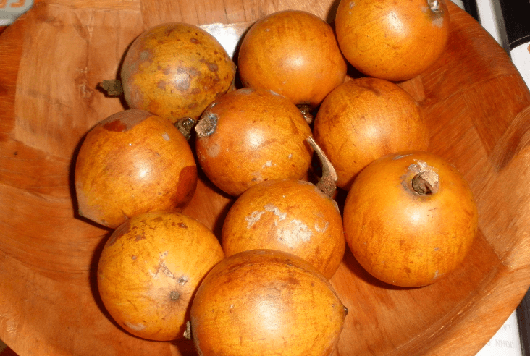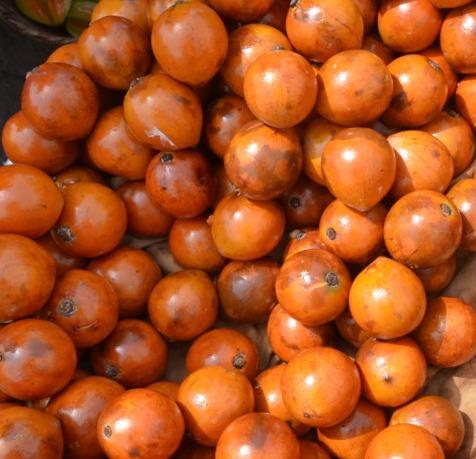African star apple – also known as white star apple, “cherry”, agbalumo (Yoruba), udara (Igbo) and otien (Edo) – in Nigeria, is associated with the dry season. Botanically called Chrysophyllum albidum (Fam. Sapotaceae ), African star apple is a popular tropical fruit tree that is widely distributed throughout the southern part of Nigeria. Agbalumo is common in both urban and rural centres especially during the months of December to April. The exotic fruit has a chewable, edible skin that ranges in colour from green to orange, depending on the stage of ripeness.
Constituents
Agbalumo is a good source of fibre, vitamins and minerals, including potassium, calcium, vitamins A and C and folic acid. Tannins, flavonoids, terpenoids, proteins, carbohydates and resins are the phytochemicals that have been reported in agbalumo. Methanolic extract of the cotyledons from the seeds of Agbalumo have led to the isolation of eleagnine, tetrahydro- 2 -methylharman and skatole. Anthraquinone and cardiac glycosides are also present in the leaves.

Pharmacological actions and medicinal uses
Herbal practitioners are known to use the bark of the tree to treat yellow fever and malaria, while the leaves are useful for treating wounds, stomachache and diarrhoea. The seeds are used to treat vaginal and skin infections in some parts of the country.
Studies have shown that a serving of agbalumo contains just 67 calories; thus making it a good option for snacking between meals for people who want to lose weight as they get fewer calories on consuming it.
Pregnant women crave for agbalumo because it has sour taste that holds the mouth, hits the palate and stops one from throwing up or spitting. It helps in improving blood flow to the placenta which carries food from the mother to the baby. Agbalumo is a natural remedy for toothache, constipation, sore throat, mouth gum disease and much more.
A study by some researchers at Covenant University, Ogun State, Nigeria showed that agbalumo lowered blood sugar and cholesterol, and could be useful in preventing and treating heart diseases. Eleagnine, an isolate from agbalumo, was further shown to exhibit antimicrobial, anti-nociceptive, anti-inflammatory and antioxidant activities.
In another study by researchers at the Forest Research Institute, Ibadan, Oyo State, agbalumo leaves exhibited strong antibacterial activity against common bacteria isolates. Susceptible microorganisms include Escherichia coli, Salmonella typhi and Shigella spp.
Preparations
The fleshy pulp of the fruits is eaten especially as snack. Decoctions of the roots, barks and leaves of agbalumo have been employed in folk medicine. The leaf is used as an emollient, the cotyledons from the seeds are used as ointments. Water and methanolic extracts from the leaves may contain active agent(s).
Adverse effects
Sweet cherries can elevate blood sugar levels more than sour cherries. Agbalumo leaves tend to have toxic effects when eaten in large quantities. If eaten in excess by a pregnant woman, agbalumo increases acidity, causing nausea and vomiting. Loose stools and diarrhea may occur due to eating too many cherries.
Economic uses and potentials
The seeds may be used for local games. The fruit pulp is an excellent source of raw material for industries. Economic Studies on the production of fruit juice from a locally sourced fruit African star apple revealed that production cost/500ml Tetra Pak of Agbalumo juice stood at ₦37.48.
The fleshy and juicy fruit is a potential source of soft drinks. The fruits are suitable for the production of fruit jams and jellies. Research findings could be of commercial interest to both pharmaceutical companies and research institutes in the production of new drugs. (Nigeria Natural Medicine Development Agency)











Please how can I use agbalumo leave to treat wound?
medications without a doctor’s prescription india pharmacy drugs
tadalafil pills: http://tadalafilonline20.com/ tadalafil max dose
viagra without presc is there anything over the counter that works like viagra? is 20mg cialis equal to 100mg viagra
how long for viagra to kick in viagra competitor alternative to viagra
6d4ci khwo6 spdp
where can you buy viagra for women buy viagra paypal online viagra buy
payday loan direct lenders ohio payday loans top rated cash advance e broad st
viagra on;ine cvs viagra generic viagra without perscription
can you split a 20mg cialis aphrodisiaques cialis effet cheap cialis online pharmacy
precios de viagra levitra y cialis how long can you take cialis kesan penggunaan cialis
cash advance new castle indiana a payday advance loan payday loan in madison al
fast no fax payday loans today america first credit union cash advance fee nevada title and payday loans inc. las vegas nv
buy viagra without prescription viagra canadian generic ingredients for viagra
best online pharmacy stores prescription drug medicine online shopping
overseas pharmacies anyone ever order viagra online canadian pharmacies without an rx
viagrasuperforte viagra online .au free free viagra
viagra from canada mexican pharmacy online medications buy prescription drugs without doctor
cialis online pharmacy online medicine tablets shopping canadian drugs pharmacy
canadian viagra canada pharmacy online canadian pharmacy cialis 20mg
cialis with dapoxetine orignal cialis dapoxetine and cialis
prescription prices comparison price prescription drugs Cialis